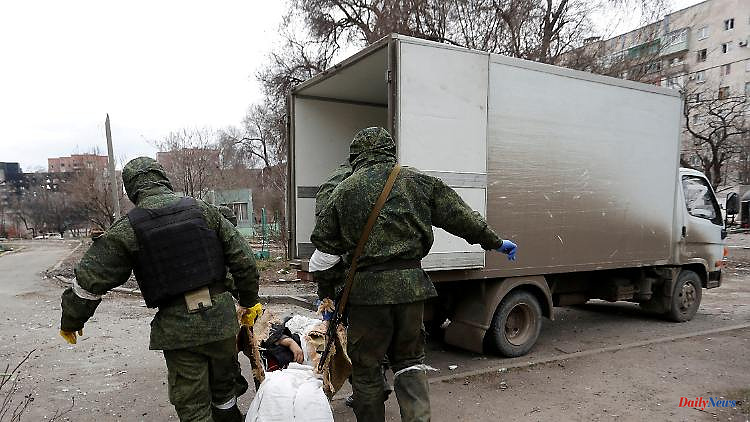29-year-old Ukrainian Shaivoronok lost his leg but saved his life. During the siege of Mariupol he was taken prisoner by the Russians. In the military hospital of the Kremlin troops he suffers from hunger and misery, but an exchange brings him freedom.
In summery Kyiv, the war in eastern Ukraine seems far away. Amidst the bustling crowd, Vladyslaw Shaivoronok stands, leaning on crutches, with the insignia of the Ukrainian Azov regiment on his chest. His left pant leg is empty. Behind the 29-year-old Ukrainian soldier, above the entrance to the town hall, hangs a large banner that reads: "Liberate the Mariupol defenders."
Shaivoronok fought in the southern Ukrainian port city until he was injured and captured. "It got worse and worse, harder and harder," he says of the last days of the Russian siege. "We maintained the defense for as long as we could," he says of the fighting at the Azov steelworks, which was among the fiercest in the war that has now lasted six months.
On February 24, Russian troops invaded Ukraine and within a few days had encircled the strategically important port of Mariupol on the Sea of Azov. Shaivoronok says he and his comrades took up positions in the huge Azov steelworks in March. Under constant fire, he set up his camp in a half-destroyed bunker and did his duty as a drone pilot during the day. "The entire area was littered with fragments of buildings," he says.
Despite the rapidly deteriorating situation in the steelworks, morale among the Ukrainians was good, reports the 29-year-old. They would have expected some kind of decisive battle and prepared for it.
On May 15, Shaivoronok was injured when an anti-tank missile hit him and was taken to the "medicine bunker" half dead. His leg was amputated the next morning. He was only conscious for a few seconds afterward before being carried out of the Azov Steelworks. He remembers seeing Russian soldiers wearing the "Z" symbol, the Ukrainian says.
Because of his serious injury, he was spared detention in the notorious Olenivka detention center, where dozens of Ukrainian prisoners were reportedly killed in an explosion last month. Instead, Shaivoronok was taken to a hospital in the Donetsk region, where a different kind of ailment awaited him.
"There was no contact with relatives, no access to the phone," he says. Medical care was "very inferior" and medicines were scarce. "I was just a piece of dripping, putrid meat," the soldier recalls. He only got antibiotics from the fifth day. He and three other soldiers at his station were given just enough food "so that the heart doesn't stop."
His month and a half in captivity ended without warning. "We were woken up at four in the morning, the lists were read out, we were taken outside, loaded onto buses and drove until evening," says Shaivoronok. He and around a hundred other injured Ukrainian prisoners were able to leave the hospital as part of a prisoner exchange.
Shaivoronok tries to play down his serious injuries with a joke: "I gave our doctors a lot of work." As a career soldier, despite his injuries, he continues to fulfill certain military obligations, says the 29-year-old, who talks about his fate in a very calm tone. His voice falters only once when he talks about the thousands of Ukrainians who are still in Russian captivity. "It doesn't give me peace of mind. It's pushing from the inside. When the boys are back I'll be able to breathe more freely."












